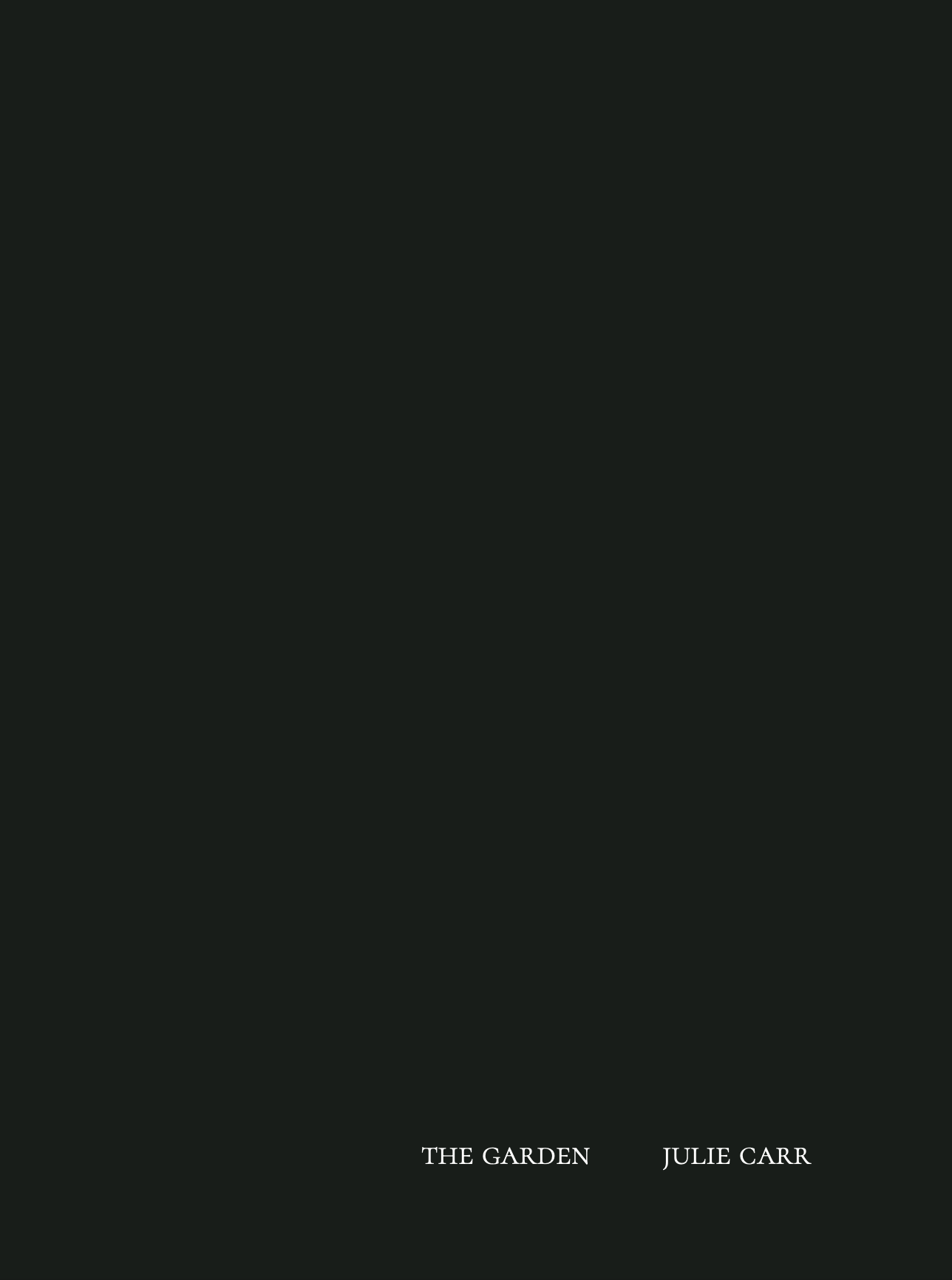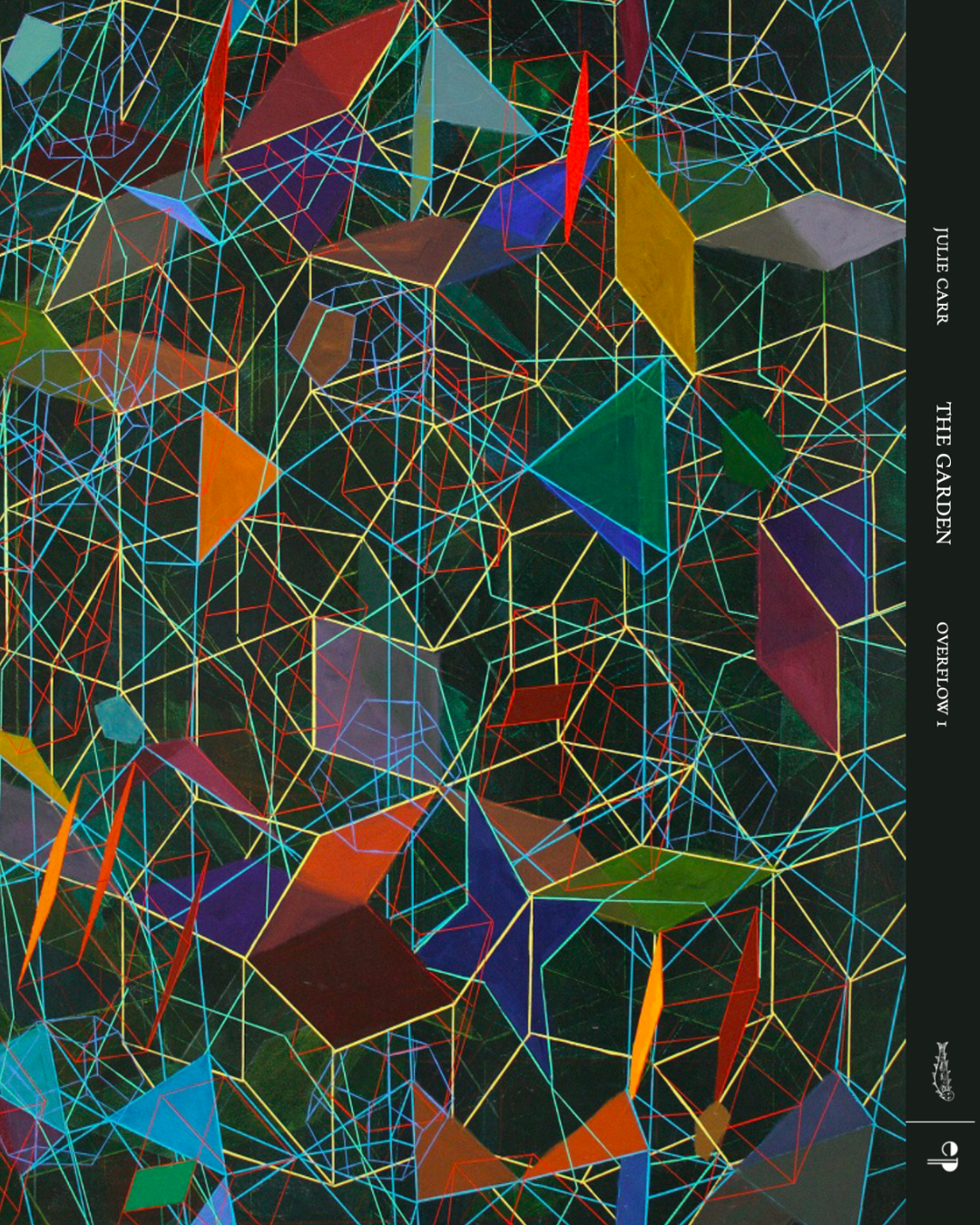THE GARDEN
Julie Carr’s The Garden, book one of the trilogy Overflow, dedicates itself to two seminal figures in Carr’s life: the painter Tony Robbin, who paints four-dimensional space, and the theoretical physicist, feminist, and philosopher, Karen River Barad.
Through a spirited series of fractured and interwoven narratives, The Garden reorients themes of time, war, Jewishness, memory, techno-biology, friendship, and grief. The garden, as a foundational site of fallness, separation, and loss, is also where we discover desire, becoming, and poiesis. This work of essay-auto-fiction embraces the porous vulnerability of beings appearing in the overflow, the violence and rapture of the ongoing “now.” A city is invaded as a lost child is found, a swastika reanimates itself across the internet, a bullet grazes a girl in parking lot, a Moroccan Jewish grandmother witnesses Operation Torch from a Casablanca rooftop, a boy raised in Yokohama in the aftermath of the atomic blasts grows up to father a baby with a hole in his heart: these moments that resound backwards and at the same time shoot forwards, this “oftening, over-and-overing, and aftering,” is what we call history.
PRAISE FOR THE GARDEN
“‘What was pain and from where did it arrive’, Julie Carr’s new book wonders: from history, from the nucleus, or screen; is it in the water, the land, sky or self? The Garden somehow manages to dream and see clearly, through the fallout of the centuries’ violence, or the bullet hole in today’s shirt. Echoing ghost stories told by Maimonides and Celan, listening in to the confessions of friends and suicides, dancing and sleeping, Carr’s lucid prose is built in sentences ‘which we, like sailors, believed to be paradise’. But if ‘Paradise is only ever a thought,’ it can be found here – a site of damage and loss, guarded by a flaming sword. Enter the garden: you’ll find it abandoned like the great books, burnt, abundant. It is a place for thinking about what ‘we destroy by using it too well’: whether that’s the earth itself, or the one who says so, and has the power to leave.”
— ANDREA BRADY
“In The Garden, the poet Julie Carr asks, ‘What world would unfold, what lifeways result once we all learned to see as my uncle saw—in four, rather than three, spatial dimensions?’ Carr’s writing unmoors knowledges, bidden and unbidden, that enter and shape us, our perceptions, and those we love. She is alert to history, to the frailties of the body, and to the specificities and betrayals of both. Here is the everydayness of violence, of tenderness and desire. The Garden is filled with a deep and feeling intelligence that will stay with and work on me for some time.”
— CHRISTINA SHARPE
“The question of who we are in relationship to the violences we live with is front and center in Julie Carr’s cinematic and transformational new book. These violences inform everything, from what we grow and eat, to how we work and love, and, perhaps most importantly, to how we survive the apocalypse of our own bodies. These beautiful narratives cross continents, decades, and portals to situate us in a world where everything is normal and exploding at the same time, where art, empire and fascism are entangled with science, technology, and the tenderness of intimacy and grief. ‘The music as a black hole’: this too is desire amid the endless poetry of disappearance, decay and collapse.”
— DANIEL BORZUTZKY
There is a steadfastness in The Garden, a storyteller. In our hour of restless alienation and total war, you will recognize this steadfastness, where, as the storyteller says the orphan said, "only humility is revolt."
Why is there a storyteller in the garden when it is "getting harder to tell a story from beginning to end"? Because the storyteller is a gardener, one among many neighborhood ancestors: the smoker, the tenant advocate, the grandmother, the teacher, the Malak, the optometrist, the cousin, the arborist, the dancers... Is the garden a real garden? Yes, the garden is a real garden. I have even, I think, visited it. Though, the garden is real, only, between worlds, as you will read, "this residue of war (harbinger of war)".
15 years after the incommensurable, intimate lessons of 100 Notes on Violence, Julie Carr gives up her most sensitive and pressing text, nearly oratory—as if recited from bed over decades—and nearly everywhere—as if transcribed on foot within dilated minutes. Along the routes, obliterated and generated, of human catastrophe, the first volume of OVERFLOW is an afterlife, a tiny microcosm, of Mohammed V's great refusal to play with fascists.
— ROBERT YERACHMIEL SNIDERMAN

